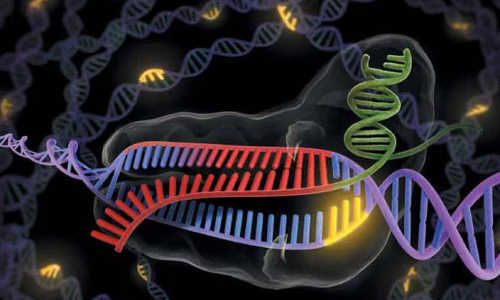Emory scientists have adapted an antiviral enzyme from bacteria called Cas9 into an instrument for inhibiting hepatitis C virus in human cells.The results were published April 27, 2015 in Proceedings of the National Academy of Sciences.
Cas9 is part of the CRISPR genetic defense system in bacteria, which scientists have been harnessing to edit DNA in animals, plants and even human cells. In this case, Emory researchers are using Cas9 to put a clamp on RNA, which hepatitis C virus uses for its genetic material, rather than change cells’ DNA.
Although several effective drugs are now available to treat hepatitis C infection, the approach could have biotechnology applications.
“We can envision using Cas9-based technology to prevent viral infections in transgenic animals and plants, for example,” says co-senior author David Weiss, PhD, assistant professor of medicine (infectious disease) at Emory Vaccine Center and Emory University School of Medicine. “This is a proof of principle that we can re-engineer Cas9 to target RNA in human or other mammalian cells. Here, we’re targeting a viral RNA, for which there is no corresponding DNA in the cells.”
Co-first authors of the paper are Microbiology and Molecular Genetics graduate students Aryn Price and Tim Sampson. Sampson is now a postdoctoral fellow at Caltech. Price and associate professor Arash Grakoui, PhD, who together study hepatitis C virus immunology, teamed up with Weiss and Sampson, who specialize in pathogenic bacteria, to develop the hybrid approach.
Other scientists have already modified CRISPR/Cas9 technology to target RNA in a test tube, or to prevent RNA production in cells. What’s distinctive about the technique described in the PNAS paper is that Cas9 is being directed against viral RNA.
In the laboratory, Cas9 and a “guide RNA” directing Cas9 against hepatitis C virus could slow down viral infection of cultured liver cells. These tools could inhibit, but not completely shut down, an established infection.
The RNA-targeting technique resembles RNA interference, which scientists use as a tool for shutting off selected genes in cells, animals and plants. RNA interference is part of an experimental drug aimed at fighting Ebola virus infection, as well as other potential drugs aimed at treating high cholesterol or liver diseases.
However, RNA interference hijacks machinery human and animal cells use to control their own genes, and many viruses have developed sophisticated mechanisms to manipulate this machinery in their host cells.
“Since Cas9 is a bacterial protein and eukaryotic viruses have likely not encountered it, they would not have ways to evade Cas9,” Weiss says. “Thus, Cas9 could be effective in inhibiting viruses when the RNAi system cannot.”
With CRISPR, bacteria incorporate small bits of DNA from phages (viruses that infect bacteria) and use that information to fight off the phages by chewing up their DNA. The system was originally discovered by dairy industry researchers seeking to stop phages from ruining the cultures used to make cheese and yogurt.
The Emory researchers obtained the Cas9 enzyme from Francisella novicida, a relative of the bacterium that causes tularemia. Weiss and his colleagues previously discovered that in F. novicida and other bacteria, Cas9 plays roles in gene regulation and in evading the mammalian immune system.
Story Source:
The above story is based on materials provided by Emory Health Sciences.





